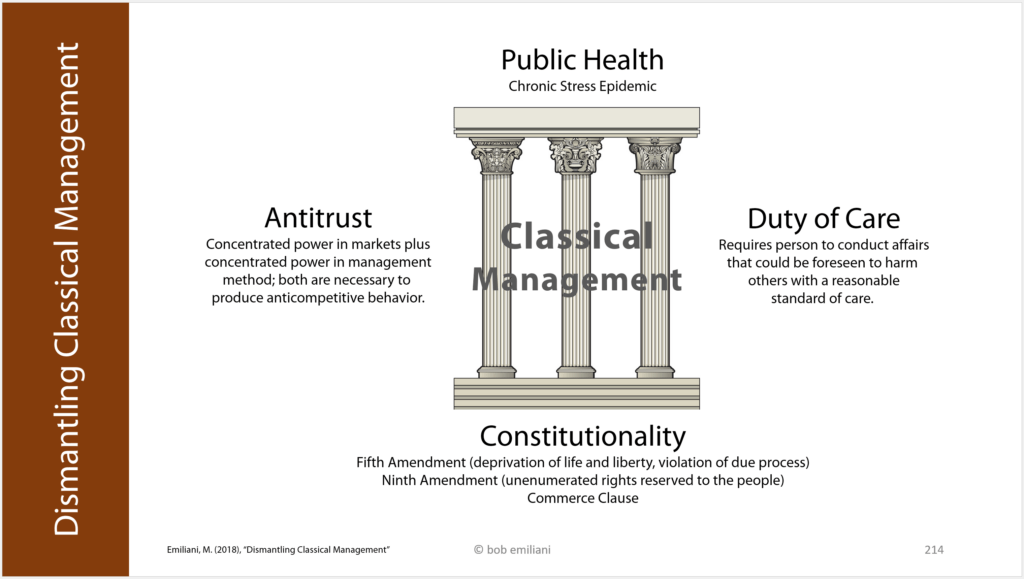In a recent blog post titled “Lean Zombies,” there was a conversation on LinkedIn that should be of interest to everyone in the Lean community. The text accompanying the LinkedIn post read: “By now, almost everyone realizes that Lean has been reduced to a small suite of popular tools that have been absorbed into classical management and their use is typically circumscribed to lower-level workers. Where do we go from here?”
Indeed, where do we go from here?
Jeff Morrow: “It seems the tide of extreme Financialism that blew up avatars of large scale Capitalism like Boeing and GE may have slacked, if not reversed. GE led the way to grandeur and collapse, and now has emerged as a quiet avatar of Lean (per W. Churchill: ‘Americans always do the right thing – after they have exhausted the alternatives.’). The FTC and Justice Department have made it harder to extract monopoly rents by buying market power, making value creation from respected, innovative stakeholders a more attractive strategy. Per Charlie Munger: ‘Show me the incentives, and I’ll show you the outcome.’ To boost Lean, make stock buybacks illegal, tax stock trading mildly, end cheap money, enforce antitrust laws, and, Boeing: bring Shingijutsu back.”
Bob Emiliani: “Sure, take away the CEO playbook and some CEOs will be forced into Lean… at least until they can undo the rules.”
Dan McDonnell: “Actually, this gave me a related thought. Change corporate taxation to be half related to margins and half to balance sheet assets. That shock would get C Suites around the country scrambling to figure out how to reduce the cost of capital, to massively reduce inventory levels, to focus much more on ROTC [return on total capital], and so on. Suddenly the tenets of lean outcomes from successful deep mature lean transformations might seem much more attractive and there will become a pull for it (no pun intended) versus the push up the mountain it takes now.”
Bob Emiliani: “This is the type of thinking that needs to happen for progressive management to become more widely practiced. Legal and government policy remedies (as I wrote about in The Triumph of Classical Management book) are a way forward. To do that requires a major long-term lobbying effort and funding. Who in Lean world is be capable of organizing that? Nobody seems to have that vision. To date, the effort has been centered in informing the small Lean community about success stories (preaching to the choir). That will not change anything. Lean world needs to get past its narrow parochial vision of success.”
Jeff Morrow: “Yeah, these are heavy lifts that will take time, perhaps as long as it took Friedmanian/shareholder value ideology to infect business intellectuals, regulators, and the judiciary after 1970. The good news is that others are already lifting and the ‘fruits’ of market concentration increasingly chap our collective asses.”
Individuals and groups that are serious about change put up the money to fund the effort (activism, lobbying, legal challenges) to produce the result that they seek. But an important thing that I have learned over the years is that the Lean people with a lot of money — resulting from Lean no less! — are notoriously cheap. In addition, they tend to be strongly (reflexively, if not fanatically) against any government legislation or policies that limit business or CEOs rights and privileges.
So do they really want to see Lean management proliferate? Thus far, the answer seems clear: No. Instead of confronting the problem, you get benign (low complexity, low social risk) actions such as this, whose likely outcome will be this, and this ridiculous attempt to achieve change.
Additionally, can Lean be taken seriously if there is no plan to affect change beyond continuing to communicate success stories to those who are already committed to Lean? This makes Lean look more a hobby than a genuine movement for change.
My book, The Triumph of Classical Management Over Lean Management, includes a chapter titled “Dismantling Classical Management.” In it, I proposed four ways to create a better environment for progressive management to flourish, as shown in the image below.

These four ideas need to be tested and retested over a long period of time — not try it once and give up. This would be the mission of a “Lean Think Tank,” funded by wealthy patrons, to challenge the status quo in court and which lobbies for changes in government policies in support of free markets — true competition, not make-believe competition — and reduced bureaucracy.
There are other ways to create a better environment for progressive management to flourish.
- Re-incorporate as a benefit corporation or not-for-profit corporation
- Establish affiliations or partnerships between Lean organizations and labor unions
- Bottom-up organizing for progressive management (protests, strikes, etc.)
- Sustained advertising campaign to inform society about the differences between progressive management and classical management
The vision that Lean advocates want to make reality cannot be achieved with the stagnant plan that has long been in place. New thinking is needed. Though one never knows; a bad plan plus a timely change in circumstances could produce the needed change and make a bad plan look pretty good. But don’t be fooled; it was the change in circumstances, not the plan, that produced the change.
